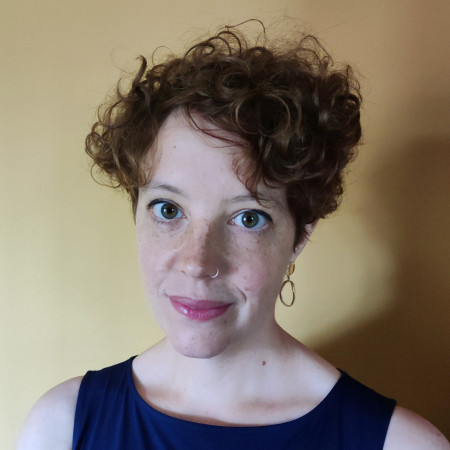
Dr Marie Thompson
Senior Lecturer In Popular Music
Biography
Professional biography
I joined the Open University as a Lecturer in Popular Music in 2020. Prior to this, I held a position in the University of Lincoln's School of Film and Media, where I taught on Sound and Music Production and Media Studies degree programmes. I gained my PhD in 2014 from Newcastle University's International Centre for Music Studies. I also hold a BA (Hons) in Music/Popular Music and an MA in Musicology from the University of Liverpool.
Research interests
My main areas of research interest are:
- Gender, race, and auditory technoculture
- Musical interventions into social reproduction
- Theories of noise and its use as a musical resource
- Tinnitus, aural difference and musical listening
My monograph Beyond Unwanted Sound: Noise, Affect and Aesthetic Moralism was published by Bloomsbury in 2017, and I am the co-editor of Sound, Music, Affect: Theorizing Sonic Experience (Bloomsbury, 2013). Other recent publications have appeared in Contemporary Music Review, Textual Practice, Women and Music and Parallax. More information about these can be found under the Publications tab.
I am the Principal Investigator of the AHRC-funded project Tinnitus, Auditory Knowledge and the Arts, which explores how the arts might help to enrich understandings of tinnitus and the diverse ways it affects listeners. I am also the co-founder (with Annie Goh) of Sonic Cyberfeminisms, an ongoing project that critically and creatively interrogates the relationship between gender, sound, technology and feminist practice.
My research has been presented internationally in various academic and public forums, including on BBC Radio 4's Thinking Allowed; at music festivals including CTM (Berlin), MUTEK (Montreal), DICE (Berlin) and Noiseexistance (Hamburg); at cultural institutions including the British Library, Tate Liverpool and the ICA; and as keynote presentations for the Punk Scholars Network, The Future Sound of Pop Music conference and for Capacious: Affect Inquiry/Making Space conference. I will be delivering the keynote Peter le Huray lecture at the Royal Musical Association’s 2020 Annual Conference.
Teaching interests
My teaching interests concern the cultural study of music. I am the module chair of A874: MA Music Part 2 and have been a member of the module team for Central Questions in the Study of Music. I was the lead author of the short course AXS006: Dolly Parton: Music, Identity and Culture , which introduces Parton and her music in relation to various social, cultural and musical issues. I also produced teaching materials on the politics of sound systems for AXS005: Sound Systems in Popular Music: from Jamacian Dub to Stadium Rock.
I was the lead of a FASSTEST teaching scholarship project concerned with the ‘white racial frame’ in music studies. The project explored how issues relating to whiteness, race and colonialism can be more effectively incorporated into current Music teaching materials at the Open University.
Projects
Transfer In - Tinnitus, Auditory Knowledge and the Arts
The aim of this project is to interrogate the multidirectional relationship between tinnitus and the arts, with the aim of enriching understandings of tinnitus and diversifying dominant cultural tropes about it. Around 30% of people experience tinnitus at some point in their lives, with prevalence increasing with age. In the humanities and in popular discourse, descriptions of tinnitus rarely extend beyond evocations of ringing in the ears. Yet experiences of tinnitus are varied and variable. The project proposes that the arts - as a field concerned with self-expression and sensory, subjective and contextual experience - may serve a key role in developing alternative methods, frameworks and terminologies that can effectively account for tinnitus' variations, resulting in better understandings of the diverse ways in which tinnitus is experienced by listeners. In this project, tinnitus is framed as an auditory sensation with diverse manifestations and a critical lens through which to re-evaluate understandings of auditory experience in the arts and humanities. The objectives are explored through four questions: 1) how can the creative arts generate and mediate knowledge about tinnitus? 2) How does tinnitus transform concepts of listening, embodiment, noise and soundscape? 3) How might practice-based arts research be used to develop alternative approaches to tinnitus, enriching understandings of the condition? 4) How might the creative arts be beneficial to the tinnitus community?
Publications
Book
Beyond Unwanted Sound: Noise, Affect and Aesthetic Moralism (2017)
Book Chapter
A Conversation on Race, Sound, and the Im/possibility of Decolonised Listening (2022)
Sonic Feminisms: Doing Gender in Neoliberal Times (2020)
Experimental music and the question of what can a body do? (2017)
Journal Article
Introduction: The aesthetics of tinnitus (2024)
"Is your baby getting enough music?" Musical interventions into gestational labor (2022)
Sonic Cyberfeminisms: Introduction (2021)
Your womb, the perfect classroom: pre-natal sound systems and uterine audiophilia (2021)
Sounding the Arcane: Contemporary Music, Gender and Reproduction (2020)
Spinoza and musical power (2019)
Whiteness and the Ontological Turn in Sound Studies (2017)
To soothe or remove? Affect, revanchism and the weaponized use of classical music (2017)
Feminised Noise and the ‘Dotted Line’ of Sonic Experimentalism (2016)
Other
Sharing Tinnitus: A Creative Toolkit for Tinnitus Support Groups (2026)